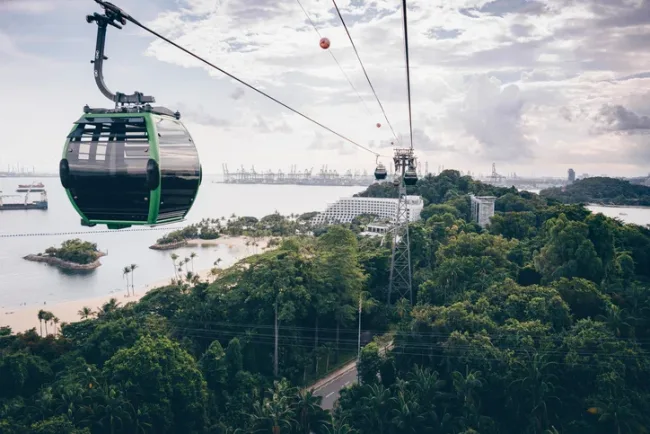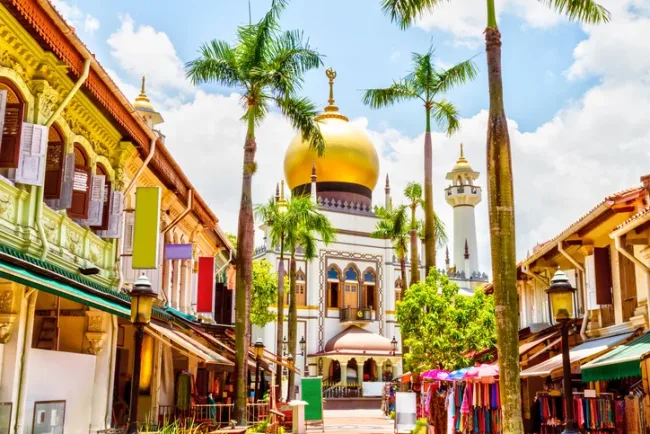
Singapore
Welcome to Singapore
What are the essentials for a Singapore visa application? Let's explore this together. This guide will help you identify the right visa for your journey. We aim to simplify this part of your travel preparations, allowing you to focus on organizing your visit to Singapore.

What’s a Singapore eVisa, and who’s it for?
Who’s the Singapore eVisa for?
This eVisa is only available to travelers from Armenia, Azerbaijan, Belarus, Georgia, Kazakhstan, Kyrgyzstan, Moldova, Russia, Tajikistan, Turkmenistan, and Uzbekistan.
Who’s not eligible for a Singapore eVisa?
-
Nationals from countries that don’t require a visa to enter Singapore. This includes all ASEAN member states, plus countries like Gambia, Ghana, Kenya, Argentina, Australia, and more.
-
Countries that don’t qualify for the Singapore eVisa must apply for an embassy visa or through a local Singaporean contact or a strategic partner in Singapore. They include Afghanistan, Bangladesh, Egypt, Jordan, and more.
-
Individuals carrying refugee travel documents or alien passports.
-
Holders of the APEC Business Travel Card (ABTC) displaying the "SGP" code on the back.
Do you need to apply for a Singapore eVisa? Use our Visa Checker Tool to find out.
What’s the purpose of the Singapore eVisa?
-
Tourism activities include exploring Singapore's attractions, enjoying vacations, and visiting family and friends.
-
Business activities like attending meetings, conferences, and networking events, but not employment.
How long can you stay with a Singapore eVisa?
This visa allows multiple entries into the country and is valid for up to 63 days. The duration of each stay in Singapore can be 30 days at maximum.
What’s a Singapore Arrival Card, and who’s it for?
Who’s the Singapore Arrival Card for?
The Singapore Arrival Card (SGAC or SG Arrival Card) has replaced the old paper-based disembarkation/embarkation card needed for immigration. It includes an electronic health declaration to keep track of the health status of visitors coming into Singapore.
All international visitors, visa required or not, need to complete the SGAC and health declaration before they land in Singapore.
This does not apply to:
-
Travellers transiting or transferring through Singapore without going through immigration.
-
Singaporean citizens.
-
Permanent residents of Singapore.
-
Long-term pass holders (like those with a Student's Pass, Dependant's Pass, Long-Term Visit Pass, and Work Pass) entering at land checkpoints.
What’s the purpose of the Singapore Arrival Card and electronic health declaration?
-
To record your travel and health details.
-
To facilitate contact tracing for essential health concerns, such as COVID-19.
-
To help enforce quarantine or isolation measures when necessary.
How long can you stay with a Singapore Arrival Card?
You must submit a fresh SGAC for each entry, which stays valid until you arrive or until your visit ends, depending on which comes first.
What are the Singapore long-term visa options, and who are they for?

Singapore provides various long-term visa options catering to different needs, such as work, study, business, and living in the country. Let's look at some of the more popular ones.
Embassy visa: You must apply for this visa at a Singaporean embassy, consulate, or visa application center. It's perfect for planning short visits for tourism, business, or family gatherings.
Work holiday program: Aimed at eligible students and recent graduates, this option offers a unique blend of work and vacation in Singapore for a set period.
Employment Pass: Tailored for professionals, managers, executives, and experts, this pass is generally valid for two years and can be renewed.
Personalised Employment Pass: This is for high earners who already have an Employment Pass or are foreign professionals from abroad.
Entrepreneur Pass (EntrePass): Designed for foreign entrepreneurs keen on launching and running a new business in Singapore.
S-Pass: This work pass is for mid-skilled foreign workers, allowing them to live and work in Singapore.
Work Permit: Available for skilled and semi-skilled workers from abroad in various industries.
Dependant's Pass: Issued to dependents of those holding an Employment Pass, EntrePass, or S-Pass.
Long-Term Visit Pass: For long-term visitors like common-law spouses, step or disabled children, or parents of those with an Employment Pass or S-Pass.
Student Pass: For international students studying in Singapore.
While we don't currently process these visas, you can get more detailed information from the [Singapore Ministry of Foreign Affairs website] (https://www.mfa.gov.sg/).
Staying healthy in Singapore: Here’s what you need to know
-
If you’re coming from a region prone to yellow fever within six days before entering Singapore, you must show a valid yellow fever vaccination certificate.
-
Stay informed about Singapore’s COVID-19 guidelines, including any quarantine, testing, or vaccination proof requirements, via your airline or the Singapore Immigration & Checkpoints Authority website.
Medical facilities
-
In major urban areas like Singapore City, Jurong Town, and Woodlands, top-notch private hospitals and specialized centers offer excellent care with English-speaking staff.
-
Rural areas may have more basic healthcare services, with limited facilities.
-
For reliability and quality, international travelers prefer private healthcare, though it can come at a high cost.
-
Pharmacies are easily accessible in cities and towns, providing a wide selection of common drugs.
Health insurance
We highly recommend arranging for travel health insurance before your journey.
In Singapore's main cities, private healthcare facilities are of high quality but can also be quite pricey. Ensure your insurance policy covers substantial medical costs.
Check with your insurance provider to ensure your policy includes:
-
Reimbursement for any trip cancellations, delays, or interruptions.
-
Coverage for medical treatments and the expense of medical evacuation.
-
Protection for lost luggage.
Things to be aware of when visiting Singapore

-
Food and water safety: Stick to bottled water, skip the ice, wash fruits and veggies well, and be selective about eating street food.
-
Stay alert around wildlife: Watch out for animals in the wilderness.
-
Stay safe in the water: Follow all the safety rules and guidelines for water-related activities.
-
Dealing with the heat: Drink plenty of water and use sunscreen to shield yourself from the intense Singapore sun.
Medication for personal use
-
Always declare: Make sure to declare any controlled substances or prescription meds upon arrival.
-
Keep the original packaging: Carry medicines in their original containers with prescription labels visible.
-
Have a prescription or doctor's note: Carry along documentation like a prescription or a letter from your doctor that explains the need for your medication.
-
Be aware of restrictions: Before traveling, verify that your medications are allowed in Singapore by contacting the nearest Singapore embassy or checking the Health Sciences Authority (HSA) website.
-
Carry what you need: Only bring the medication you need for your trip to avoid complications.

 Australia ETA Online
Australia ETA Online
 United Kingdom ETA
United Kingdom ETA
 India Tourist eVisa
India Tourist eVisa
 Canada ETA Visa
Canada ETA Visa
 Turkey eVisa
Turkey eVisa
 Egypt eVisa
Egypt eVisa
 Singapore SG Arrival Card
Singapore SG Arrival Card
 Indonesia eVoa Visa
Indonesia eVoa Visa
 Aruba ED Card
Aruba ED Card


